Pattaya Mail special correspondent
Peter Cummins was talking to Denis D. Gray, Chief of Bureau of the
Associated Press, in Bangkok recently and Denis was effusive in his praise
of the Mail’s achievements and coverage of events, now broadened
considerably through our AP wire service subscription.
As old friends do, when they have not met for a long
time, we reminisced about old times, events and mutual friends. The name
Peter Sutcliffe came up and Denis remembered an article which Peter had
sent him: it could almost be A Tale of Two Cities in the Dickensian mode,
except that it is a hilarious look at two other cities: Geneva and Manila.
On a quick scan, I saw my ghost, re-appearing from the past, in the very
first paragraph.
As many of our readers are familiar with both
places, we present Peter’s (yes, another Peter), wonderful piece here.
With a very minor edit, this is a very humorous insight into life in
Geneva as against life in Manila.
(Still in Geneva; looking towards Manila)
There’s a silence about this Geneva Sunday night that
can only be described as Swiss.
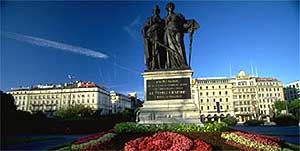 Swiss
silences are absolute, especially the Sunday ones, ordained as they are by
the laws of both God and man. A friend in Bangkok never comes any more
because he can’t sleep; it’s too quiet. (That ‘friend’ is the
Pattaya Mailman, Peter Cummins). I still have items of his clothing at the
back of a closet; he left so abruptly. The bags under his eyes could only
be described as Swiss.
Swiss
silences are absolute, especially the Sunday ones, ordained as they are by
the laws of both God and man. A friend in Bangkok never comes any more
because he can’t sleep; it’s too quiet. (That ‘friend’ is the
Pattaya Mailman, Peter Cummins). I still have items of his clothing at the
back of a closet; he left so abruptly. The bags under his eyes could only
be described as Swiss.
The American economist John Kenneth Galbraith once told
me that Switzerland is the only country on earth where he sits by the
telephone hoping it will ring.
I had a busy day, mind you. It rang twice. The first
call was from a Scots lass inquiring about my “house for sale” ad.
Presbyterian Sundays in Scotland being what they are - let’s skip the
details - she will feel quite at home here. The second was from Jesse
James (I kid you not), a mountain guide high in the hills of North Wales,
who wondered if I needed rescuing.
As a matter of fact, I do.
If you had endured the 30 years’ worth of Swiss
Sundays I’ve been through, you would understand how important these
incoming voices are in the broader scheme of things. For Man needs to know
with some certitude that he is not alone in the universe, that
recognisable Life does exist Out there and what is more possesses the IT
capability to pierce even the Helvetic silence barrier.
This of course would not be possible had the Russians
not invented the telephone. And, for that matter, the electric light,
paper and the Parkervitch roller-ball pen, without which this despatch
would be as chaff in the wind and Switzerland’s estrangement stretch to
eternity. Nor should it escape notice that it was a foreign resident in
Geneva, Mr. Tim Bemers-Lee at CERN, who conjured up the World Wide Web;
the act of a desperate man, perhaps, but a stroke of genius for all that.
(I forget the meaning of the acronym CERN, but I do remember that it was a
very gloomy edifice somewhat outside Geneva, on the road to France.)
The Web has already done much for Mankind. Notably, it
has demolished the Swiss Post Office, whose pricing policy was based on
the certainty that customers would pay anything to get a message out. Mr.
Galbraith’s economist chums call this “comparative advantage”; in
plain-speak, it means that when your man is down, that’s the time to
kick his head in. Moreover, the country being land-locked,
messages-in-bottles were never a competitive option. Also, word-of-mouth
transmission has been stifled for decades by the astronomic cost of
visiting Switzerland, which has reduced the traffic of foreign
arrivals/departures to near-zero. Thus has the conspiracy of silence been
perpetuated.
It seems that only Science can descend to our aid, with
its Soviet telephones, paper and roller-ball pens (and no doubt the Red
Web too, had they not been overtaken in the nick of time by that other
great 20th century invention, the garbage bin of history).
Mind you, it’s beginning to get out of hand. CERN is
running amok. Bored with the primitive Web, CERN boffins are now beavering
away on The Grid.
Watch out for The Grid. Compared to The Grid, the Web
is but a tablet of stone such as those familiar to Moses on the mount (see
www.exodusXXIV.xii.com). For The Grid will be able to process all the
information produced since the creation of the solar system in exactly
one-trillionth of a nanosecond and transmit it instantly to every cyber
cafe on the planet.
You may think this is a good thing, but consider the
ramifications. The vital work of a multitude of baseball and cricket
statisticians will be performed before lunch by a single MIT student
intern. Composers, running off symphonies in their tea-breaks, will
bankrupt unemployment insurance funds. Chess Grand Masters will be
obsolete. The Times crossword, of course, is finished.
 Some
will say all this is not only inevitable but desirable, nay indispensable
for the survival of homo sapiens and his headlong pursuit of happiness.
Some
will say all this is not only inevitable but desirable, nay indispensable
for the survival of homo sapiens and his headlong pursuit of happiness.
I myself incline to the minority view that science
alone cannot assuage our craving for human contact. The Grid will no more
speak to my condition than the Web; if I had one, that is.
No, my basic need is for human presence that a
millennium of Swiss Sundays has obliterated, human presence made manifest
by noise; a decibel confirmation of the proximity of a friendly life-form
which rejoices in proclaiming its existence. Loudly.
Happily, this felicitous condition can still be found
in certain parts of the globe. One of them is the Philippine Islands.
I shall emigrate thither without delay.
You see, I happen to know that in the Philippines they
have 600 million cellphones in constant use for a population of 45 million
souls, most of whom also keep roosters, dogs, goats and water-buffalo
together with countless small children who play in the street all the time
and call you “Victory Joe.” Now, I like that.
Also, motorists know from birth that the horn button is
there for a purpose, namely to lean on in Manila’s infamous and
ubiquitous traffic jams, which, by law, are required to occupy permanently
all urban open spaces, along with pneumatic drills and political
demonstrations. They have a lot of them over there.
Traffic jams, by the way, are compelled by presidential
decree to remain motionless at all times. Successive generations are known
to spend their entire lives in them, at substantial transportation cost
savings. Jam-generations can be relied on to maintain noise levels when
the car battery dies.
As for covered urban public spaces, these contain
breakfast meetings, Rotary lunches, PTA lectures, World Bank seminars,
beauty contests and Toastmaster competitions. As other mortals crave an
Olympic gold medal or a lottery jackpot, Filipinos cherish a Toastmaster
diploma. Filipinos love public speeches, even in the privacy of their own
homes. If a Filipino is not actually making a public speech at any given
point in time, he/she is cheering one. If by chance they are doing neither
of these things it’s be cause they are singing.
Filipinos love to sing. They sing like birds. This is
just as well, for there are no birds. They quit a while back when their
comparative advantage collapsed. Now the sky is crammed with helicopters
conveying busy senators and generals to the golf club.
Mention has yet to be made of television. This is too
vast a subject to be examined here in any depth. Suffice it to say that,
at a conservative estimate, over half of all the TV cameras in the Pacific
rim are in use day and night covering all of the activities outlined
above. Not only that: TV receivers have a special control feature enabling
all 758 channels to be played simultaneously. TV is thus a wonderful
educational tool. Filipino parents love TV.
Did I tell you about the loudspeaker industry?
Filipinos love loudspeakers. They never leave home without one, assuming
of course they leave home, what with the traffic jams and all. Roughly
one-third of the active labour force in Metro Manila is engaged in this
industry. They do a great job. For example, to summon your chauffeur to
collect you from the breakfast briefing/Rotary lunch/IMF seminar/beauty
contest/street riot/coup d’etat of your choice, they use loud-speakers
with a range of hundreds of miles. They’ve been picked up in Hong Kong,
when the trade winds blow from the east. This also is just as well,
because more and more Manila drivers now have to go to Hong Kong to find a
parking slot.
Filipinos love Hong Kong. They love all those shopping
malls stacked with hi-fl gear and Chinese firecrackers. But they don’t
stay long. Too quiet.
If all else fails, this largely Catholic nation can
count on a beneficent Deity to lay on a volcanic eruption, an earthquake
or a few hurricanes to tide one over. It goes without saying that
Filipinos love Him devoutly.
On this evidence, it would be crazy to live anywhere
else.
When you pass that way, you’re welcome to drop in on
Victory Joe to hear for yourself. I promise you everything except
silence-stress.
You can call me anytime.

 Swiss
silences are absolute, especially the Sunday ones, ordained as they are by
the laws of both God and man. A friend in Bangkok never comes any more
because he can’t sleep; it’s too quiet. (That ‘friend’ is the
Pattaya Mailman, Peter Cummins). I still have items of his clothing at the
back of a closet; he left so abruptly. The bags under his eyes could only
be described as Swiss.
Swiss
silences are absolute, especially the Sunday ones, ordained as they are by
the laws of both God and man. A friend in Bangkok never comes any more
because he can’t sleep; it’s too quiet. (That ‘friend’ is the
Pattaya Mailman, Peter Cummins). I still have items of his clothing at the
back of a closet; he left so abruptly. The bags under his eyes could only
be described as Swiss. Some
will say all this is not only inevitable but desirable, nay indispensable
for the survival of homo sapiens and his headlong pursuit of happiness.
Some
will say all this is not only inevitable but desirable, nay indispensable
for the survival of homo sapiens and his headlong pursuit of happiness.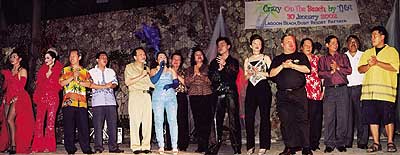
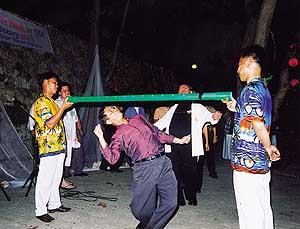 Manit
Boochim TAT director does the Limbo Rock.
Manit
Boochim TAT director does the Limbo Rock.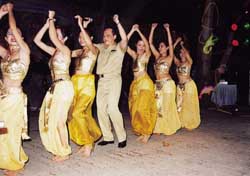 The
THA president led the girls in ‘Shake your boogey’.
The
THA president led the girls in ‘Shake your boogey’.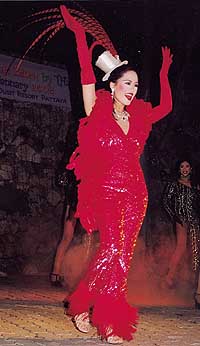 ‘Hey
Big Spender’ Alisa Phanthusak out performs the Tiffany’s Cabaret
dancers.
‘Hey
Big Spender’ Alisa Phanthusak out performs the Tiffany’s Cabaret
dancers.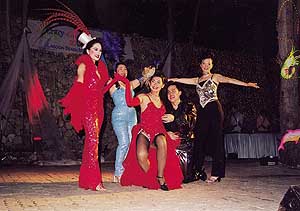 ‘Life
is a cabaret’ - these hoteliers proved to be very professional show
people in their own right.
‘Life
is a cabaret’ - these hoteliers proved to be very professional show
people in their own right.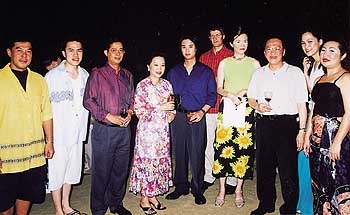
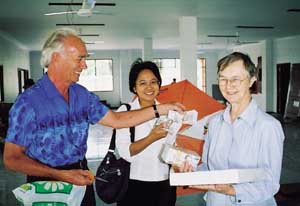 Father
Ton presented 1,190,000 baht to Sister Joan and Sister Jemjit to be used
to help build the new Fountain of Life Center, located behind the Pattaya
Driving Range.
Father
Ton presented 1,190,000 baht to Sister Joan and Sister Jemjit to be used
to help build the new Fountain of Life Center, located behind the Pattaya
Driving Range.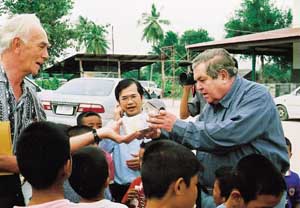 Father
Ton then dropped by the Redemptorist Center Street Kids Home in Banglamung,
where presented another 1,190,000 baht to Father Ray Brennan, as Father
Pichan (center) and a host of delighted children looked on in excitement.
Father
Ton then dropped by the Redemptorist Center Street Kids Home in Banglamung,
where presented another 1,190,000 baht to Father Ray Brennan, as Father
Pichan (center) and a host of delighted children looked on in excitement.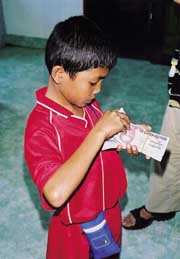 Children
at the Camillian Center in Rayong had never before seen such treasure and
took great delight in counting out 1,190,000 baht.
Children
at the Camillian Center in Rayong had never before seen such treasure and
took great delight in counting out 1,190,000 baht.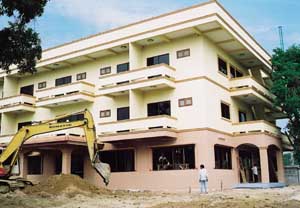 The
1,190,000 baht Father Ton presented to Sister Joan and Sister Jemjit will
be used to help build the new Fountain of Life Center, located behind the
Pattaya Driving Range, which should be completed any day now.
The
1,190,000 baht Father Ton presented to Sister Joan and Sister Jemjit will
be used to help build the new Fountain of Life Center, located behind the
Pattaya Driving Range, which should be completed any day now. Father
Ton of the Sanoek Foundation (back right) visited Father Giovanni at the
Camillian Center in Rayong, where the needs of unfortunate individuals
with HIV and AIDS related health problems are tended to. Father Giovanni
(back left) gratefully accepted Father Ton’s donation of 1,190,000 baht.
Father Giovanni takes care of the sick and dying throughout the nine
provinces in the eastern region, where, he says, the highest number of HIV
cases in the country are concentrated.
Father
Ton of the Sanoek Foundation (back right) visited Father Giovanni at the
Camillian Center in Rayong, where the needs of unfortunate individuals
with HIV and AIDS related health problems are tended to. Father Giovanni
(back left) gratefully accepted Father Ton’s donation of 1,190,000 baht.
Father Giovanni takes care of the sick and dying throughout the nine
provinces in the eastern region, where, he says, the highest number of HIV
cases in the country are concentrated.